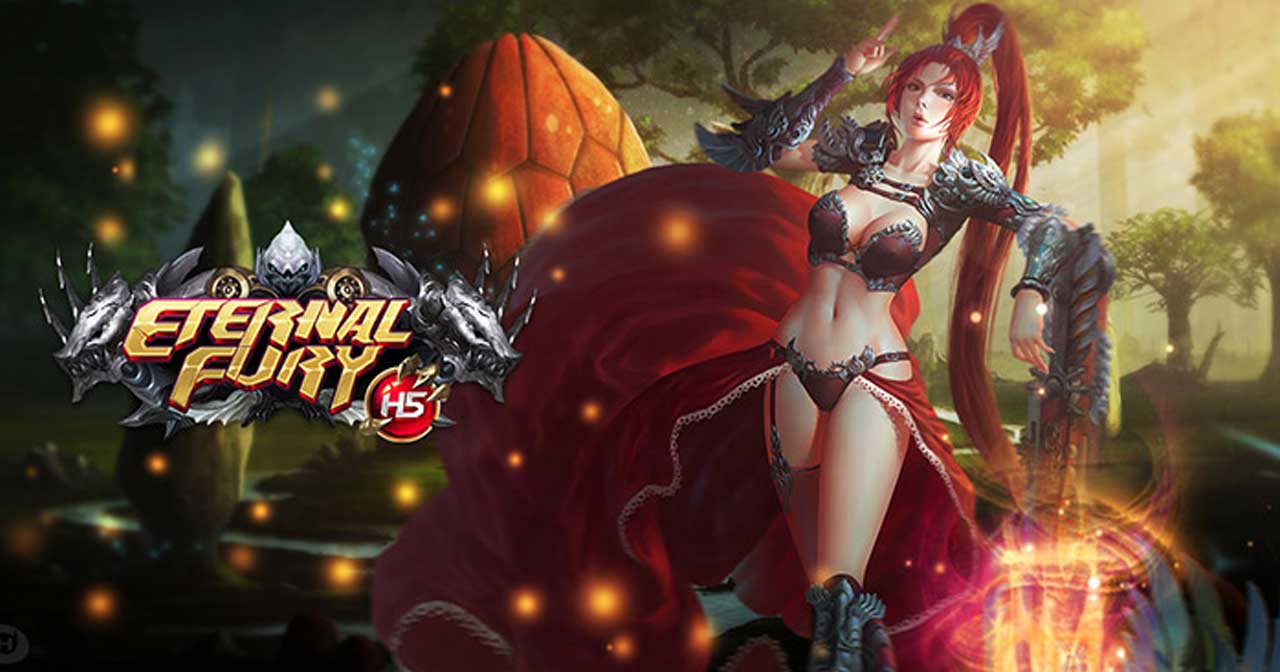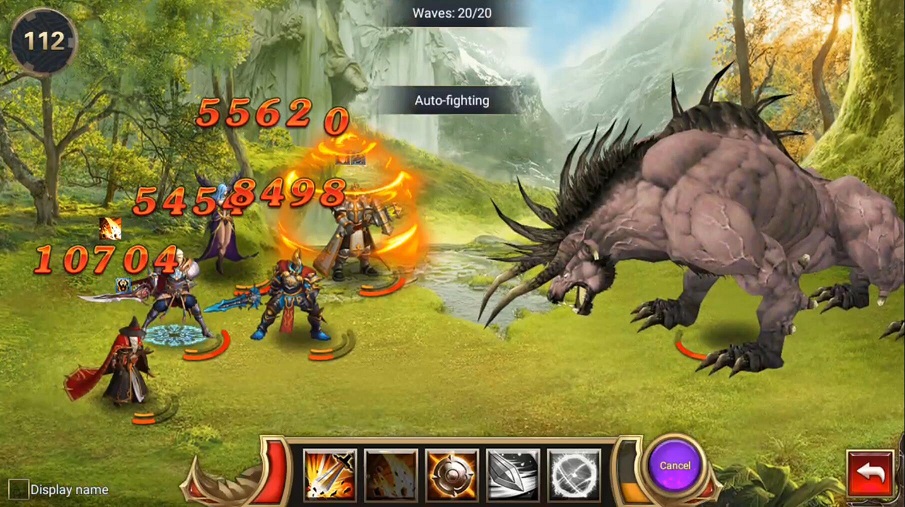
Eternal Fury
| Genre: MMORPG |
| Rating: |
There’s something oddly comforting about strategy games with a mythological twist—like slipping into a realm where the stakes feel ancient but your choices are right-now urgent. Eternal Fury doesn’t whisper for your attention. It marches in, decked out in gothic armor, eyes glowing, practically shouting: “You ready for war?” And weirdly enough, you might just say yes.


That First Login—When the Magic Kinda Hits
You know that split-second when a game boots up and your gut instinct kicks in? Eternal Fury hits you with moody orchestral music, rich medieval menus, and a UI that's… surprisingly welcoming. There’s no fumbling through clunky tutorials or endless walls of text. Instead, the game nudges you into the action—like it knows you’ve played something like this before, but also that you’re here to explore something new.
The aesthetic? It walks this fine line between castles-and-dragons classic and apocalyptic myth—with archangels and demons lurking around like it’s no big deal. And that’s part of the charm. You’re not just building stuff or fighting waves of enemies. You’re stepping into a layered world where ancient gods and strategic warfare collide—and somehow, it just works.
Strategy Meets Myth—A Gameplay Combo That Actually Works
Let’s cut to the chase—Eternal Fury is two games in one. On one hand, it’s a turn-based tactical battler. On the other, it’s a castle-builder with resource management, alliances, and upgrades that actually matter. That combo can be a mess in the wrong hands. But here? It plays out like a chess match draped in mythological drama.
Combat has that old-school Final Fantasy flavor—your heroes line up, trade blows, and trigger flashy skills that actually feel powerful. It’s strategic without being overwhelming. Sure, there are timers and cooldowns and all the usual systems, but it never feels like you’re buried in mechanics.
The best part? The balance. You’re not forced to become a spreadsheet nerd to enjoy the game. Casual players can build teams and win battles without overthinking every stat point. But if min-maxing is your jam? There’s enough depth here to keep your inner tactician busy for weeks.
Heroes, Chaos, and… a Whole Lot of Gear
So let’s talk heroes. Eternal Fury gives you a fat stack of them—each with unique skills, passive buffs, and visual flair. Some look like fallen angels; others could’ve walked straight out of a Norse saga. But are they more than pretty faces?
Actually… yeah. Team synergy matters. Positioning matters. And with each upgrade—be it a weapon enhancement, a new skill, or a class transformation—you feel like you're shaping your own mythology. There's something oddly satisfying about taking a random hero you didn’t care about and suddenly realizing they’re your MVP after one smart build tweak.
And the gear system? It's not just stat padding. Equipment changes the way fights unfold. Some pieces even unlock passive perks that can flip the tide of battle. It’s layered, but not obnoxiously so. You never feel like you need a PhD in game theory to make progress. Just a good eye and a bit of patience.
Building a Kingdom—With Just the Right Amount of Stress
Now, onto the kingdom side of things. You’re not just commanding troops—you’re building a literal stronghold from the ground up. Think barracks, blacksmiths, treasury buildings… all the medieval trimmings. But here’s the thing—it doesn’t feel like a chore.
Why? Because progression feels purposeful. Upgrading your castle isn’t just about unlocking new things—it’s about reinforcing your playstyle. More offense? Fortify your troops. Prefer defense? Build up your walls and train your archers. It’s personal.
There’s a rhythm to it, too. You log in, collect resources, set buildings to upgrade, check your hero gear, pop into a quick PvP skirmish, and you’re done—or hooked, depending on the day. And honestly, that loop can be weirdly addictive.
PvP That Feels Personal
Now, let’s get into the blood and bones of Eternal Fury: PvP. It's not just slapping someone else's army and calling it a day. There's strategy here. And tension. And moments where you're one move away from a glorious comeback—or a crushing defeat.
The arena system is clean, and ranking up feels fair (most of the time). You can test out new team combos, figure out counters, and stalk your rivals like it's a medieval version of fantasy football. And Guild Wars? That’s where the adrenaline really hits. There’s real camaraderie there—trash talk in the chat, coordinated attacks, revenge arcs… the whole nine yards.
One night, you're logging in “just to check your castle.” Next thing you know, it’s 1 AM and you're mid-fight, your guildmate yelling, “We NEED you in this match!” It's chaotic, it’s sweaty, and it's weirdly beautiful.
The Visuals & Sound—Gritty, Gorgeous, or Just Meh?
Alright, cards on the table: Eternal Fury won’t win any Oscars for innovation. But it does know what it is—and it leans into that hard.
The visuals are like a love letter to the golden age of fantasy RPGs. Think bold colors, dramatic lighting, and over-the-top character designs that feel one tweak away from heavy metal album covers. It’s dramatic, sure—but fittingly so.
Animation-wise, everything runs smooth. Skills feel meaty. Explosions pop. Even the menus have that old-school charm that makes you feel like you’re navigating ancient scrolls instead of modern UI tabs.
And the soundtrack? Haunting, melodic, sometimes even a little sad. But it works. It fades into the background when it should, and swells when things get serious. And that eerie cathedral theme in the main hall? Might be stuck in your head for a while.
Progression, Events & Daily Play—Does It Respect Your Time?
Here’s where things get tricky. Eternal Fury walks a fine line between “rewarding progression” and “daily homework.” Some days, you’re all in. You log in, crush an event, grab epic loot, and feel like a god. Other days? The daily tasks start to feel a little like your to-do list IRL.
But here’s the thing—it’s optional. Most events are generous with rewards, even if you’re not top-tier. And seasonal events? Those are where the devs get creative. One week you’re farming pumpkins; the next, you’re hunting corrupted angels in some cursed dimension.
And for casual players? It’s still manageable. You can skip a few days without falling into the void. That said, if you’re the type who has to check every box… maybe set a timer. Or three.
What Keeps You Coming Back (Or Makes You Rage Quit)
Let’s be honest—strategy games have a weird emotional pull. You’re not just playing. You’re invested. You care about your troops. You remember that one battle where you won with a single hero left at 1 HP. You get annoyed when your kingdom gets raided at 2 AM. And yeah, sometimes you rage-quit when your daily progress gets wiped by a surprise counterattack.
But that’s the ride, right?
What really hooks you is the sense of growth. You’re not just upgrading numbers—you’re getting smarter. You start recognizing patterns. You build better teams. You learn when to push and when to hold back. And that sense of mastery? It hits different.
Add in the social aspect—guild chats, rivalries, alliances—and suddenly, it’s not just a game. It’s a place. A weird, myth-soaked, semi-apocalyptic place where your choices actually matter.
The Verdict—Should You Jump In?
If you're into games that combine smart strategy with mythological flair, Eternal Fury is probably already your next obsession. It’s got enough tactical meat to keep veterans engaged, but it's accessible enough that newbies won’t feel like they walked into a board meeting without a pen.
Is it perfect? No. There are grindy patches. PvP can feel punishing. And sometimes, the menus feel like they were designed by someone who really loved complexity. But those are small prices to pay for the bigger picture.
Because at its core, Eternal Fury isn’t just about war. It’s about building something that matters—whether that’s your kingdom, your team, or your place in an ever-changing fantasy world.
So yeah—if your inner warlord is itching for action, or if you just miss that feeling of commanding heroes who actually look like they could win an arm-wrestling match with Zeus… Eternal Fury is calling. And it’s calling loud.
Let me know if you’d like this article reformatted for WordPress or broken into parts for easier readability. I can also help create title tags, meta descriptions, or a featured snippet block if needed!